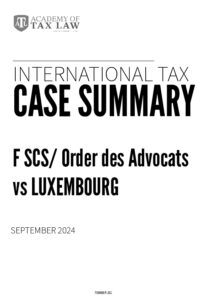F SCS/ Ordre des avocats vs Luxembourg: CASE SUMMARY
Home » Case Library »
F SCS/ Ordre des avocats vs Luxembourg: CASE SUMMARY
Case Information
- Court: Court of Justice of the European Union (Second Chamber)
- Case No: C-432/23
- Applicant: F SCS, Ordre des avocats du barreau de Luxembourg
- Defendant: Administration des contributions directes (Luxembourg Inland Revenue)
- Judgment Date: 26 September 2024
- Download the FULL JUDGMENT
Judgment Summary
This case focuses on whether the Netherlands’ national tax law, which restricts the deduction of interest paid on intra-group loans in certain scenarios, is compatible with the freedom of establishment under Article 49 TFEU. The dispute involved X BV, a Dutch entity, and its parent company, based in Belgium, which had provided loans to finance the acquisition of shares in another entity. The Netherlands tax authorities denied X BV’s interest deduction, claiming the loans were part of a “wholly artificial arrangement” intended to avoid taxes in the Netherlands. X BV argued that the loans were conducted on arm’s length terms and thus should be deductible. However, the ECJ upheld the tax authority’s decision, emphasizing that even if the transaction is on arm’s length terms, it can still be considered artificial if it lacks genuine economic substance.
The Court ruled that Article 49 TFEU does not prevent national legislation from denying the deduction of interest paid on intra-group loans, even if contracted at arm’s length, when the loans are part of a wholly artificial arrangement. This ruling is significant as it expands the concept of artificiality beyond non-arm’s length transactions, focusing more broadly on the economic purpose behind them.

